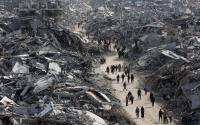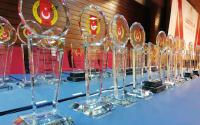13 September 2004Khassan Baiev The Boston Globe
The pictures of the Russian children being carried out of the school in Beslan, their naked bodies splattered with blood, filled me with sorrow and anger. No excuse exists for the slaughtering of innocent civilians. No excuse exists for taking children hostage, blowing up planes or suicide bombings. Those responsible for such carnage have forfeited their right to be called human beings.What made those scenes from Beslan so anguishing for me was that I had seen them all before. As a wartime surgeon in Chechnya I had treated the broken bodies of children - the young girl whose parents were blown up by a bomb before her eyes, the little boy whose hair turned white overnight, small bodies pierced by hundreds of pieces of shrapnel. And everywhere blood.I do not claim to understand the mentality of a terrorist willing to sacrifice children. However, as a Chechen and a doctor with firsthand experience of the war, I can offer some context into what turns ordinary people into extremists willing to commit such atrocities.We have been fighting Russia on and off for 400 years. Our nation is small, a third the size of Belgium, with a prewar population of one million. In the recent 10-year war with Russia, 250,000 people died, fully a quarter of the population. Of those deaths, an estimated 42,000 were children. And our children are still dying, from gunfire, from mines, from an unexplained illness resulting from the contaminated environment caused by the war.History has taught us to fear Russia. The belief of most Chechens that the Kremlin would like to eliminate them is fueled by the deportations. In the 19th century the czarist government exiled us to Turkey, Jordan and Syria. In 1944, Stalin herded our whole population into cattle cars and shipped us to Siberia. A third of us perished on the journey or in the harsh conditions of exile.We had hoped that with the breakup of the Soviet Union we might at long last attain independence from Russia. We are Muslims. We speak a different language. We have different traditions. However, our dream of self-rule evaporated when Boris Yeltsin invaded our country with a force of 300,000 Russian soldiers on Dec. 11, 2003.For the past 10 years Chechnya has been occupied by a foreign invader. Occupation breeds violence, which invites lawlessness on both sides. The abuses of civilians by Russian soldiers have been documented by various human rights organizations - Physicians for Human Rights, Human Rights Watch, Amnesty International and the Russian human rights organization Memorial. Young Russian soldiers are also dying unnecessarily.Ordinary Chechens share my sorrow at the terrible carnage at the school in Beslan. But they are also fearful, knowing that they will be blamed. They are bracing themselves for reprisals. The Kremlin spin doctors have done a good job of casting us as international terrorists masterminded by Muslim extremists from the Middle East. Sadly, most people believe the propaganda, even though we do not know the ethnic composition of the hostage takers in Beslan. It does not matter. The school siege resulting in the deaths of hundreds of children was a heinous crime whoever was responsible.I fear for the future of Chechnya - and of Russia, too - as President Vladimir Putin vows to place his country on a wartime footing against terrorism. Violence begets violence. If there is no peaceful resolution to the Russian-Chechen conflict, terrorism is likely to increase. More young women will strap on suicide belts, women who are not the puppets of Middle East extremists but mothers, daughters and wives driven mad by loss. Increasingly Chechnya will become a cause for extremists who have declared war on the Western way of life.The tragedy at the school in southern Russia should be an opportunity for both sides to start negotiations. I would like to see President George W. Bush take a role in bringing peace to this conflict instead of accepting President Putin's version of the story that Chechens are bandits controlled by Osama bin Laden. Without a commitment by the international community, more innocent children will die on both sides of the conflict.Khassan Baiev, author of "The Oath," a memoir of his wartime experiences in Chechnya, is head of the International Children of Chechnya, a nonprofit group. This comment first appeared in The Boston Globe.






